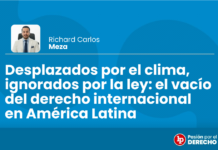Fundamento destacado: 116. La Corte deja claro que el acceso al agua potable no es, como tal, un derecho protegido por el artículo 8 de la Convención. Sin embargo, la Corte debe tener en cuenta el hecho de que sin agua, los seres humanos no pueden sobrevivir. Por lo tanto, la falta persistente y prolongada de acceso al agua potable puede, por su propia naturaleza, tener consecuencias adversas para la salud y la dignidad humana, erosionando efectivamente el núcleo de la vida privada y el disfrute de un hogar en el sentido del artículo 8. Por lo tanto, cuando se cumplen estas condiciones estrictas, la Corte no puede excluir la posibilidad de que una alegación convincente pueda desencadenar las obligaciones positivas del Estado en virtud de esa disposición. La existencia de esa obligación positiva y su posible contenido están necesariamente determinados por las circunstancias específicas de las personas afectadas, pero también por el marco jurídico y la situación económica y social del Estado de que se trate. El Tribunal de Justicia considera que la cuestión de si en el presente asunto se han desencadenado obligaciones positivas y el alcance de dichas obligaciones, que son las cuestiones centrales que deben examinarse en cuanto al fondo, están estrechamente vinculadas a las circunstancias específicas del asunto y a su grado de gravedad. Por lo tanto, existe un fuerte vínculo entre la cuestión de la aplicabilidad y el fondo del asunto en la apreciación de si en el presente asunto se plantea o no una cuestión relativa a la vida privada.
[Traducción de LP]
116. The Court makes clear that access to safe drinking water is not, as such, a right protected by Article 8 of the Convention. However, the Court must be mindful of the fact that without water, human beings cannot survive. A persistent and long-standing lack of access to safe drinking water can therefore, by its very nature, have adverse consequences for health and human dignity, effectively eroding the core of private life and the enjoyment of a home within the meaning of Article 8. Therefore, when these stringent conditions are fulfilled, the Court is unable to exclude the possibility that a convincing allegation may trigger the State’s positive obligations under that provision. The existence of any such positive obligation and its potential content are necessarily determined by the specific circumstances of the persons affected, but also by the legal framework and the economic and social situation of the State in question. The Court considers that the question whether any positive obligations were triggered in the present case and the scope of such obligations, which are the core issues to be examined on the merits, are closely linked to the specific circumstances of the case and their level of seriousness. There is therefore a strong tie between the question of applicability and the merits in the assessment of whether or not a private-life issue is raised in the present case.
[Idioma original]
CASE OF HUDOROVIČ AND OTHERS v. SLOVENIA
(Applications nos. 24816/14 and 25140/14)
JUDGMENT
Art 8, Art 3 and Art 14 • Allegedly insufficient measures to ensure access to safedrinking water and sanitation for Roma communities • Positive obligations triggered only by persistent and long-standing lack of access to safe-drinking water having adverse consequences for health and human dignity effectively eroding core rights under Art 8 • Existence and content of positive obligations to be determined by specific circumstances of the persons affected, legal framework and economic and social situation of the respondent State • Wide margin of appreciation accorded to States • Opportunity to access safe drinking water provided by the authorities who actively engaged with specific needs of vulnerable and socially disadvantaged community • Non-negligible proportion of Slovenian population in remote areas lacking access to public water supply and sewerage systems • Applicants not prevented from using their social benefits towards improving living conditions
STRASBOURG
10 March 2020
FINAL
07/09/2020
This judgment has become final under Article 44 § 2 of the Convention.
It may be subject to editorial revision.
In the case of Hudorovič and Others v. Slovenia,
The European Court of Human Rights (Second Section), sitting as a Chamber composed of:
Robert Spano, President,
Marko Bošnjak,
Valeriu Griţco,
Egidijus Kūris,
Ivana Jelić,
Arnfinn Bårdsen,
Darian Pavli, judges,
and Hasan Bakırcı, Deputy Section Registrar,
Having deliberated in private on 4 February 2020,
Delivers the following judgment, which was adopted on that date:
PROCEDURE
1. The case originated in two applications (nos. 24816/14 and 25140/14) against the Republic of Slovenia lodged with the Court on 26 March 2014 under Article 34 of the Convention for the Protection of Human Rights and Fundamental Freedoms (“the Convention”) by sixteen Slovenian nationals (“the applicants”), whose details are set out in the annex to this judgment.
2. The applicants were represented by Ms N. Zidar Klemenčič, a lawyer practising in Ljubljana, and the European Human Rights Law Institute, based in Nicosia. The Slovenian Government (“the Government”) were represented by their Agent, Ms J. Morela, State Attorney.
3. The applicants alleged that the State had failed to provide them with access to basic public utilities, such as drinking water and sanitation, contrary to the requirements of Articles 3 and 8 of the Convention. Relying on Article 14, they further submitted that, as members of the Roma community, they were unable to effectively enjoy the same rights as the majority population owing to the authorities’ discriminatory attitudes towards them.
4. On 8 April 2015 the Government were given notice of the applications. In addition, leave to intervene in the written procedure (Article 36 § 2 of the Convention and Rule 44 § 3 of the Rules of Court) was granted to the European Roma Rights Centre and the Human Rights Centre of the University of Ghent.
[Continúa…]



![Ley de Delitos Informáticos (Ley 30096) [actualizada]](https://img.lpderecho.pe/wp-content/uploads/2024/08/ley-de-delitos-informaticos-ley-30096-actualizada-LPDERECHO-218x150.jpg)
![Jurisprudencia del artículo 200.2 de la Constitución.- [Procesos constitucionales]](https://img.lpderecho.pe/wp-content/uploads/2025/05/BANNER-UNIVERSAL-CONTITUCION-LIBRO-LPDERECHO-1-218x150.jpg)


![Ley Orgánica del Registro Nacional de Identificación y Estado Civil (Ley 26497) [actualizada 2025]](https://img.lpderecho.pe/wp-content/uploads/2025/05/Ley-organica-del-registro-nacional-de-identificacion-y-estado-civil1-LPDERECHO-218x150.jpg)













![[Balotario notarial] Competencia notarial en asuntos no contenciosos. Bien desarrollado](https://img.lpderecho.pe/wp-content/uploads/2025/10/COMPETENCIA-NOTARIAL-CONTECIOSOS-LPDERECHO-218x150.jpg)
![CAS: Solo pueden negociarse condiciones de trabajo permitidas en el régimen CAS; por ende, no es válido homologar beneficios de régimen laboral distinto (como CTS u otros) [Informe técnico 000518-2025-Servir-GPGSC] servidor - servidores Servir CAS - LPDerecho](https://img.lpderecho.pe/wp-content/uploads/2024/05/Trabajadores-Servir-LPDerecho-218x150.jpg)

![¿Si te has desafiliado de tu sindicato te corresponde los beneficios pactados por convenio colectivo? [Informe 000078-2026-Servir-GPGSC]](https://img.lpderecho.pe/wp-content/uploads/2024/05/Servir-CAS-LPDerecho-218x150.jpg)
![Mediante el contrato por incremento de actividad el empleador puede aumentar la producción por propia voluntad y no por factores exógenos o coyunturales, lo cual debe estar establecido en el contrato y poderse acreditar [Casación 41701-2022, Lima]](https://img.lpderecho.pe/wp-content/uploads/2024/11/contratacion-irregular-de-un-trabajador-LPDERECHO-218x150.jpg)


![Disponen el aumento del alumbrado público en vías con índices de criminalidad comprobada [Decreto Legislativo 1740]](https://img.lpderecho.pe/wp-content/uploads/2022/07/Cableado-Cables-electricos-luz-poste-corte-LPDerecho-218x150.png)
![Reglamento de la Ley que crea incentivos económicos y fiscales para el fomento de las actividades cinematográficas [Decreto Supremo 001-2026-MTC]](https://img.lpderecho.pe/wp-content/uploads/2022/08/cine-LPDerecho-218x150.png)
![Código Penal peruano [actualizado 2026]](https://img.lpderecho.pe/wp-content/uploads/2024/05/VENTA-CODIGO-PENAL-LPDERECHO-218x150.jpg)
![Código Procesal Penal peruano [actualizado 2026]](https://img.lpderecho.pe/wp-content/uploads/2024/02/VENTA-CODIGO-PENAL-BANNER-POST-TAPA-DURA-LPDERECHO-218x150.jpg)
![TUO del Reglamento General de los Registros Públicos (Resolución 126-2012-Sunarp-SN) [actualizado 2026]](https://img.lpderecho.pe/wp-content/uploads/2026/02/TUO-del-Reglamento-general-registros-publicos-LPDerecho-218x150.png)
![Decreto Legislativo del Notariado (Decreto Legislativo 1049) [actualizado 2026]](https://img.lpderecho.pe/wp-content/uploads/2026/02/BANNER-REGLAMENTO-NOTARIAL2-218x150.jpg)









![[VÍDEO] ¿Quieres postular a la Fiscalía? Estas son las preguntas que hacen en las entrevistas](https://img.lpderecho.pe/wp-content/uploads/2021/10/postular-fiscalia-preguntas-entrevista-LP-218x150.jpg)
![EXP. N.° 0022-2009-PI/TC LIMA GONZALO TUANAMA TUANAMA Y MÁS DE 5000 CIUDADANOS SENTENCIA DEL TRIBUNAL CONSTITUCIONAL En Lima, a los 09 días del mes de junio de 2010, el Tribunal Constitucional en sesión de Pleno Jurisdiccional, con la asistencia de los magistrados Mesía Ramírez, Beaumont Callirgos, Vergara Gotelli, Landa Arroyo, Calle Hayen, Eto Cruz y Álvarez Miranda, pronuncia la siguiente sentencia con los fundamentos de voto de los magistrados Vergara Gotelli y Landa Arroyo, que se agregan. ASUNTO Demanda de Inconstitucionalidad interpuesta por Gonzalo Tuanama Tuanama, en representación de más de 5000 ciudadanos contra el Decreto Legislativo N.° 1089. DEMANDA Y CONTESTACIÓN a) Demanda contra el Decreto Legislativo N.° 1089, que regula el Régimen Temporal Extraordinario de Formalización y Titulación de Predios Rurales Con fecha 01 de julio de 2009, se interpone demanda de inconstitucionalidad contra el Decreto Legislativo N.° 1089, que regula el Régimen Temporal Extraordinario de Formalización y Titulación de Predios Rurales, publicada en el diario oficial El Peruano el 28 de junio de 2008. Los demandantes refieren que “'sin entrar al fondo del contenido de la norma”, ésta fue promulgada sin efectuar ninguna consulta previa e informada a los pueblos indígenas, tal como lo ordena el Convenio 169 de la Organización Internacional De Trabajo (OIT), afectándose con ello los derechos fundamentales de los pueblos Indígenas, como el derecho a la consulta previa y el derecho colectivo al territorio ancestral, establecidos en los artículos 6, 15, 17 del mencionado convenio. De igual forma, expresan que no se tomaron en cuenta los artículos 19, 30 y 32 de la Declaración de las Naciones Unidas sobre los Derechos de los Pueblos Indígenas (DNUDPI) aprobado por la Asamblea General de la Organización de Naciones Unidas. Alegan que con dicha norma se afectan otros derechos establecidos en el Convenio N.° 169, como el derecho sobre las tierras de los pueblos indígenas (artículos 13 al 19), en el considerando que no se tomaron en cuenta medida que garanticen la protección de sus derechos de propiedad y posesión. Refieren que se afecta también el derecho a la libre determinación de las comunidades nativas, previsto en el artículo 17 del Convenio, que declara el respeto de sus formas tradicionales de transmisión de sus territorios. Por último, alegan que se estaría vulnerando lo previsto en el artículo 19 del Convenio en cuanto se afecta el derecho al desarrollo de políticas agrarias adecuadas para los pueblos indígenas. [Continúa...] Descargue la resolución aquí](https://img.lpderecho.pe/wp-content/uploads/2023/01/Logo-LP-con-fondo-guinda-LPDERECHO-1068x561.png)


![El juez debe resolver las apelaciones formuladas en sede constitucional, a pesar de que el recurrente no haya sustentado los agravios correspondientes, en virtud de la especial naturaleza de los procesos constitucionales [Pleno Jurisdiccional Nacional Constitucional y Procesal Constitucional, 2023, p. 10]](https://img.lpderecho.pe/wp-content/uploads/2025/10/JUEZ-FORMULADAS-CONTITUCIONAL-LPDERECHO-218x150.jpg)
![Código Penal peruano [actualizado 2026]](https://img.lpderecho.pe/wp-content/uploads/2024/05/VENTA-CODIGO-PENAL-LPDERECHO-324x160.jpg)
![Nombre del año 2026: Año de la Esperanza y el Fortalecimiento de la Democracia [Decreto Supremo 011-2026-PCM]](https://img.lpderecho.pe/wp-content/uploads/2022/12/palacio-gobierno-1-LPDerecho-100x70.png)
![Código Procesal Penal peruano [actualizado 2026]](https://img.lpderecho.pe/wp-content/uploads/2024/02/VENTA-CODIGO-PENAL-BANNER-POST-TAPA-DURA-LPDERECHO-100x70.jpg)

![Código Civil peruano [actualizado 2026]](https://img.lpderecho.pe/wp-content/uploads/2024/05/VENTA-OFICIAL-CODIGO-CIVIL-2024-LPDERECHO-100x70.jpg)


![Jurisprudencia del artículo 200.2 de la Constitución.- [Procesos constitucionales]](https://img.lpderecho.pe/wp-content/uploads/2025/05/BANNER-UNIVERSAL-CONTITUCION-LIBRO-LPDERECHO-1-100x70.jpg)


![Código Penal peruano [actualizado 2026]](https://img.lpderecho.pe/wp-content/uploads/2024/05/VENTA-CODIGO-PENAL-LPDERECHO-100x70.jpg)





![El derecho de acceso a la función pública no comprende solo el ingreso, puesto que se debe garantizar su validez constitucional; además, el acceso a toda función pública debe observar el principio de mérito [Exp. 01962-2021-PA/TC, ff. jj. 24-25]](https://img.lpderecho.pe/wp-content/uploads/2023/01/Logo-LP-con-fondo-guinda-LPDERECHO-324x160.png)